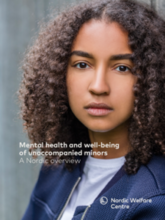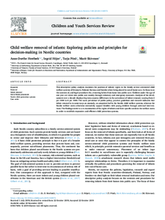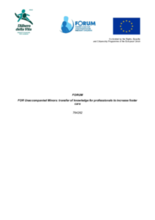Displaying 11 - 20 of 46
This report surveys different aspects of health of unaccompanied minors who have arrived in the Nordic region.
Inspired by Merton and Barber’s sociological theory on ambivalence, this article analyses ‘co-parenting’ between foster parents and birth parents as prototypes of ambivalent relationships; that is, relationships based on incompatible role requirements.
This review provides an overview and educational material on nonaccidental injury (NAI) and its clinical presentation.
This descriptive policy analysis examines the position of infants’ rights in the family service orientated child welfare systems of Denmark, Finland, Norway and Sweden when being placed in out-of-home care.
Join this webinar to walk through the PROMISE Child Participation Tool and to discuss approaches and considerations for soliciting children’s views on their Barnahus experience.
This article explores how children living in foster care create senses of belonging across diverse family relationships. It draws on video diaries made by 11 Danish children living in foster care.
The purpose of this webinar is to shed light on the specific experiences and issues of unaccompanied and separate girls in the European Response.
This study draws on in-depth interviews with eight foster care couples and explores how foster carers construct practices around bodily care and touch in new foster care relationships.
This study tests whether an expansion of the Danish aftercare scheme in 2001 affects later outcomes of foster care alumni.
This article is written as part of the FORUM project (FOR Unaccompanied Minors: transfer of knowledge for professionals to increase foster care), an EU funded project which sought to enhance the capacity of professionals to provide quality foster care for unaccompanied migrant children, primarily through the transfer of knowledge. The article aims to contribute to this transfer of knowledge by bringing together literature which is of relevance to professionals developing or enhancing foster care services for unaccompanied migrant children.



